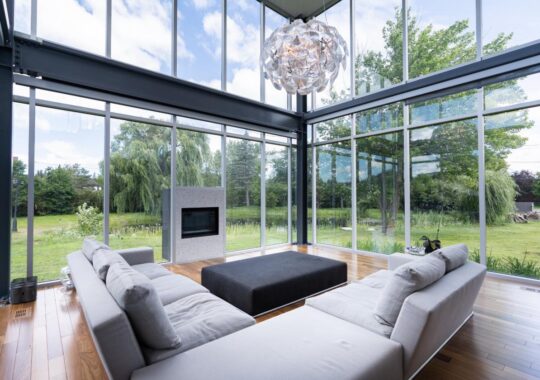Double vs. Triple Glass - Which is Right for You?
Follow us
Choosing the right glazing for your windows is a crucial decision. In our climate, double and triple glazing are two popular options. Both offer distinct advantages, but they serve different purposes and have varying performance characteristics.
Glass: The Basics.
What is Low-E (low-emissivity) coating?
Low-e is a thin, virtually invisible, metallic layer that is applied to the surface of window glass during the production process. The coating is designed to reflect a significant portion of UV rays while allowing visible light to pass through.
Low-e coatings reduce the heat transfer through the window. In the winter, they reflect heat back into the room which improves your interior warmth, whereas in the summer they reflect heat from the sun to keep the interior rooms cooler. By reducing the heat transfer between exterior and interior, windows with Low-e coatings help maintain a more comfortable interior temperature.
What is Argon gass?
Argon gas is a colorless gas that is used to fill the space between the panes of double and triple-glazing windows to help reduce heat transfers between the interior and exterior.
Argon gas acts as a thermal insulator. It slows down the movement of heat through the window, making it harder for the heat to escape in cold weather conditions but also prevents excessive heat to enter during warmer months.
Both Low-e and Argon are used in all Adurra window and door products to improve the efficiency and comfort of your home.
Double Glazing: A Standard Choice
Double glazing consists of two glass panes separated by a spacer filled with insulating gas. The space between the panes can vary, but it's typically around 14 or 16mm. The gas serves as a thermal barrier, improving insulation.

Triple Glazing: An Upgrade
Triple glazing has an additional glass pane and therefore two insulating gas-filled spaces. This creates an extra layer of insulation.

Which is right for you?
Consider the following factors when making the choice:
- Energy Efficiency: Triple glazing is the more energy-efficient option, providing superior insulation. If energy efficiency is a top priority for your home, triple glazing is a wise investment.
- Noise: If your home is exposed to higher levels of noise, triple glazing is the better option as it can reduce more sound transmission compared to double glazing windows.
- Budget: Consider your budget when making the choice - triple glazing is more costly compared to double glazing, due to the extra glass pane.
- Limitations: Triple glass windows are significantly heavier than double glass windows. Triple glazing therefore comes with sizing limitations when it comes to window and door configurations.
When comparing double and triple pane window options, there is no one-size-fits-all answer. Your choice should be based on your energy efficiency goals, noise levels, budget, and overall projected aesthetic. Both options offer significant improvements over single-pane windows, but triple glazing excels in thermal efficiency. Carefully evaluate your specific needs to determine which glazing option is the right fit for your home.





